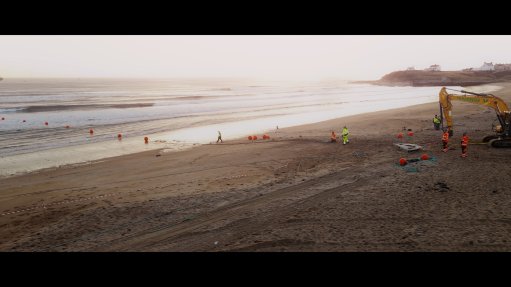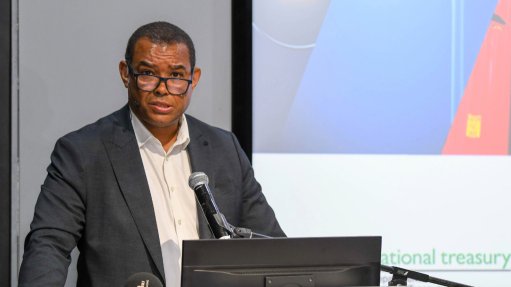DPWI taking steps to improve infrastructure delivery, stop corruption
The Department of Public Works and Infrastructure (DPWI) aims to accelerate the Construction Industry Development Board (CIDB) Amendment Bill and establish a Construction Industry Ombuds office to accredit contractors and improve compliance with and enforcement of CIDB prescripts, as well as restrict service providers who have abused the supply chain system or failed to perform on contracts, Public Works and Infrastructure Minister Sihle Zikalala has said.
"One of the major challenges we have identified that impact on the delivery of infrastructure projects, and on growth and employment prospects in the country, is the lack of consequence management for contractors short-changing the State.
"We have resolved to stem the tide on rampant corruption by unscrupulous contractors that are fleecing government through shoddy workmanship and deceitful liquidations," he said in a briefing at the weekend.
To this end, the DPWI has appointed a restriction committee and authority that is composed of cross-functional expertise including governance, risk and compliance, legal services, supply chain, construction specialists, security services and internal control representatives.
The committee’s role is to consider all cases presented to it for restricting of service providers who have abused the supply chain system or failed to perform on contracts, Zikalala said.
Further, the DPWI's procedure requires that branches that experience challenges with the performance of appointed contractors or consultants submit a motivation for restriction to the committee, which then considers the merits of the matter.
The committee also ensures that the National Treasury regulations are complied with, while the contractor or consultant must be allowed to make representations as to why they should not be restricted or blacklisted.
In terms of restriction, the department itself restricts a service provider when there are contraventions in relation to the Public Finance Management Act and/or the General Conditions of Contract regarding performance.
"When there is a contravention of procurement regulations, the DPWI is required to only recommend restriction to the National Treasury, which then considers the matter and implements restriction or not. The period for which a service provider can be restricted from doing business with government is up to a maximum of ten years," Zikalala noted.
To date, the DPWI has recommended seven service providers to National Treasury for restriction. Some of the service providers successfully appealed their cases to Treasury, with the exception of one that was involved in construction and cleaning, and the Beitbridge border post.
The cases referred back to the DPWI by National Treasury includes advice that the restriction must be made in terms of the General Conditions of Contract. These matters are now on the agenda of the Restriction Committee, which is currently processing the restrictions as part of its weekly deliberations.
Owing to the risk and poor performance by some contractors, the DPWI has recommended that the CIDB implements processes and assess registration requirements.
The culture of non-performance by contractors in both public and private projects must be addressed. Some of the companies hold the registration certificate from the CIDB, but are not qualified or at a level to undertake the scope of infrastructure work they are doing.
Therefore, the CIDB will now shift its focus in the accreditation process to take into account the capability of the contractors to undertake the work at each CIDB grading level, based on scale and scope, and ensure that this will not compromise transformation, especially gender transformation of the built environment sector.
"We are committed to ensure that contractors that deliver poor quality work or those that are involved in corruption need to be removed from the CIDB Register of Contractors.
"To further cleanse the built environment sector, the DPWI is accelerating the CIDB Amendment Bill through the proper legal processes," he added.
The Bill aims to expand the scope of CIDB’s development interventions to the private sector, to provide for improved compliance and enforcement of CIDB prescripts, and to expand the scope of the construction industry registers to include other industry participants, such as professional service providers.
"We have also directed the CIDB to establish an Ombudsman office for the construction industry. The Ombudsman Office will serve as an independent body for resolving disputes in the construction industry," said Zikalala.
OPERATION BRING BACK
Meanwhile, the DPWI is intensifying its efforts to bring back its lost assets. It is vigorously implementing a campaign dubbed Operation Bring Back.
"We are scouring every part of the country to get back lost, stolen or illegally occupied properties. We will investigate, detect, prosecute, recover and resolve the potential misappropriation of State land and buildings," he said.
The department is partnering with other institutions of government such as the Special Investigating Unit, National Prosecuting Authority, South African Police Service and courts to prosecute those that have stolen, misappropriated State land. We want to see a difference within 24 months.
"We are also engaging client departments, to whom we provide properties that are under their care for daily use, to properly return them to the department if they are no longer using them. This will enable us to protect them from illegal occupation, and help us to refurbish and re-allocate them to other public users in need," Zikalala pointed out.
Meanwhile, the DPWI aims to help resolve the unemployment challenge in the country, especially among the youth, and as part of its response, has resolved to insource some of the services by resuscitating workshops and training centres.
"Workshops and training centres will improve the upkeep of immovable assets under the custodianship of DPWI. This insourced model is aimed at using State buildings and infrastructure as a source of employment creation, and we are planning to create 5 000 jobs in the first phase of this programme."
Further, in addition to day-to-day maintenance, or reactive maintenance, the DPWI also plans to execute repair and refurbishment, or proactive maintenance, as well as minor new works projects using the insourced model.
"The employment opportunities cut across the entire life cycle of immovable assets and the maintenance thereof. This will offer opportunities for youth and unemployed graduates in electrical engineering, mechanical engineering, civil engineering, carpentry, plumbing, building, painting, welding, boiler making, rigging, water care technicians, plant and machine operation, pothole filling and repair, horticulture, and locksmithing."
Further, with regard to the project delivery element of this programme, the DPWI will still outsource certain categories of work to specialist sub-contractors. Therefore, the department will, in a very deliberate way, specifically target women- and youth-owned companies, and will work with the CIDB and community leaders to identify such contractors, he added.
"We are also reworking our mass employment opportunity programme, namely the Expanded Public Works Programme (EPWP), to be more impactful and to give a meaningful change to all participants.
"We will be recruiting and training participants to focus on road maintenance, cleaning and environmental management, renewable energy, for the solar programme for government buildings, and the cleaning of all government buildings," Zikalala said.
The focus will be on training to ensure that participants gain skills in these areas and are trained to start enterprises. The impact of the repacked programme should be seen in better maintained public facilities, potholes fixed and clean environments.
"The new EPWP must lead to the meaningful change in the life of all participants and their contribution to the growth and development prospects of the country," he emphasised.
Article Enquiry
Email Article
Save Article
Feedback
To advertise email advertising@creamermedia.co.za or click here
Comments
Announcements
What's On
Subscribe to improve your user experience...
Option 1 (equivalent of R125 a month):
Receive a weekly copy of Creamer Media's Engineering News & Mining Weekly magazine
(print copy for those in South Africa and e-magazine for those outside of South Africa)
Receive daily email newsletters
Access to full search results
Access archive of magazine back copies
Access to Projects in Progress
Access to ONE Research Report of your choice in PDF format
Option 2 (equivalent of R375 a month):
All benefits from Option 1
PLUS
Access to Creamer Media's Research Channel Africa for ALL Research Reports, in PDF format, on various industrial and mining sectors
including Electricity; Water; Energy Transition; Hydrogen; Roads, Rail and Ports; Coal; Gold; Platinum; Battery Metals; etc.
Already a subscriber?
Forgotten your password?
Receive weekly copy of Creamer Media's Engineering News & Mining Weekly magazine (print copy for those in South Africa and e-magazine for those outside of South Africa)
➕
Recieve daily email newsletters
➕
Access to full search results
➕
Access archive of magazine back copies
➕
Access to Projects in Progress
➕
Access to ONE Research Report of your choice in PDF format
RESEARCH CHANNEL AFRICA
R4500 (equivalent of R375 a month)
SUBSCRIBEAll benefits from Option 1
➕
Access to Creamer Media's Research Channel Africa for ALL Research Reports on various industrial and mining sectors, in PDF format, including on:
Electricity
➕
Water
➕
Energy Transition
➕
Hydrogen
➕
Roads, Rail and Ports
➕
Coal
➕
Gold
➕
Platinum
➕
Battery Metals
➕
etc.
Receive all benefits from Option 1 or Option 2 delivered to numerous people at your company
➕
Multiple User names and Passwords for simultaneous log-ins
➕
Intranet integration access to all in your organisation





















